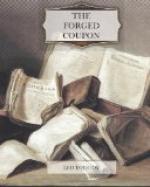“As a child I believed with passion and without any thought. Then at the age of fourteen I began to think about life and preoccupied myself with religion, but it did not adjust itself to my theories and so I broke with it. Without it I was able to live quite contentedly for ten years . . . everything in my life was evenly distributed, and there was no room for religion. Then came a time when everything grew intelligible; there were no more secrets in life, but life itself had lost its significance.”
He goes on to tell of the two years that he spent in the Caucasus before the Crimean War, when his mind, jaded by youthful excesses, gradually regained its freshness, and he awoke to a sense of communion with Nature which he retained to his life’s end.
“I have my notes of that time, and now reading them over I am not able to understand how a man could attain to the state of mental exaltation which I arrived at. It was a torturing but a happy time.”
Further on he writes,—“In those two years of intellectual work, I discovered a truth which is ancient and simple, but which yet I know better than others do. I found out that immortal life is a reality, that love is a reality, and that one must live for others if one would be unceasingly happy.”
At this point one realises the gulf which divides the Slavonic from the English temperament. No average Englishman of seven-and-twenty (as Tolstoy was then) would pursue reflections of this kind, or if he did, he would in all probability keep them sedulously to himself.
To Tolstoy and his aunt, on the contrary, it seemed the most natural thing in the world to indulge in egoistic abstractions and to expatiate on them; for a Russian feels none of the Anglo-Saxon’s mauvaise honte in describing his spiritual condition, and is no more daunted by metaphysics than the latter is by arguments on politics and sport.
To attune the Anglo-Saxon reader’s mind to sympathy with a mentality so alien to his own, requires that Tolstoy’s environment should be described more fully than most of his biographers have cared to do. This prefatory note aims, therefore, at being less strictly biographical than illustrative of the contributory elements and circumstances which sub-consciously influenced Tolstoy’s spiritual evolution, since it is apparent that in order to judge a man’s actions justly one must be able to appreciate the motives from which they spring; those motives in turn requiring the key which lies in his temperament, his associations, his nationality. Such a key is peculiarly necessary to English or American students of Tolstoy, because of the marked contrast existing between the Russian and the Englishman or American in these respects, a contrast by which Tolstoy himself was forcibly struck during the visit to Switzerland, of which mention has been already made. It is difficult to restrain a smile at the poignant mental discomfort endured by the sensitive Slav in the company of the frigid and




